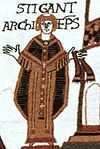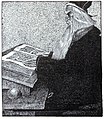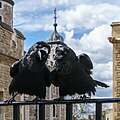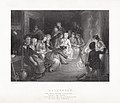Portal:United Kingdom
The United Kingdom Portal
 |
 |
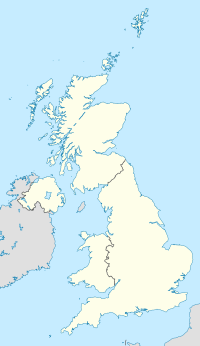
| |
The United Kingdom of Great Britain and Northern Ireland, commonly known as the United Kingdom (UK) or Britain, is a country in Northwestern Europe, off the coast of the continental mainland. It comprises England, Scotland, Wales, and Northern Ireland. The UK includes the island of Great Britain, the north-eastern part of the island of Ireland, and most of the smaller islands within the British Isles, a total area of 94,354 square miles (244,376 km2). Northern Ireland shares a land border with the Republic of Ireland; otherwise, the United Kingdom is surrounded by the Atlantic Ocean, the North Sea, the English Channel, the Celtic Sea, and the Irish Sea. The country has an estimated population of 67,596,281 people in 2022. The capital and largest city of both England and the United Kingdom is London, whose wider metropolitan area is the largest in Western Europe, with a population of 14.9 million. The cities of Edinburgh, Cardiff, and Belfast are the national capitals of Scotland, Wales, and Northern Ireland, respectively.
The lands of the UK have been inhabited continuously since the Neolithic. In AD 43 the Roman conquest of Britain began; the Roman departure was followed by Anglo-Saxon settlement. In 1066, a the Normans conquered England. With the end of the Wars of the Roses the English state stabilised and began to grow in power, resulting by the 16th century in the annexation of Wales, the domination of Scotland, and the establishment of the British Empire. Over the course of the 17th century, the role of the British monarchy was reduced, particularly as a result of the English Civil War. In 1707, the Kingdom of England and the Kingdom of Scotland united under the Treaty of Union to create the Kingdom of Great Britain. The Acts of Union 1800 incorporated the Kingdom of Ireland to create the United Kingdom of Great Britain and Ireland in 1801. Most of Ireland seceded from the UK in 1922 as the Irish Free State, and the Royal and Parliamentary Titles Act 1927 created the present United Kingdom.
The UK became the first industrialised country and was the world's foremost power for the majority of the 19th and early 20th centuries, particularly during the "Pax Britannica" between 1815 and 1914. At its height in the 1920s, the British Empire encompassed almost a quarter of the world's landmass and population, and was the largest empire in history. However, its involvement in the First World War and the Second World War damaged Britain's economic power and a global wave of decolonisation led to the independence of most British colonies. (Full article...)
Featured article
Chelsea Football Club are a professional English football club based in West London. Founded in 1905, they play in the Premier League and have spent most of their history in the top tier of English football. Chelsea have been English champions three times, and have won the FA Cup four times, the League Cup four times and the UEFA Cup Winners' Cup twice. The club had their first major success in 1955, winning the league championship. Chelsea won several cup competitions during the 1960s and 1970s, but after that did not win another major title until 1997. The past decade has been the most successful period in Chelsea’s history, capped by winning consecutive Premier League titles in 2005 and 2006, and reaching their first UEFA Champions League final in 2008. Chelsea's home is the 42,500-person-capacity Stamford Bridge football stadium in Fulham, West London, where they have played since their establishment. Despite their name, the club are based just outside the Royal Borough of Kensington and Chelsea, in the London Borough of Hammersmith and Fulham. Chelsea's traditional kit colours are royal blue shirts and shorts with white socks. (Full article...)
Featured biography
Stigand was an English churchman in pre-Norman Conquest England. By 1020 he was serving as a royal chaplain and advisor. He was named bishop of Elmham in 1043, and then later Bishop of Winchester and Archbishop of Canterbury. Stigand acted as an advisor to several members of the Anglo-Saxon and Norman English royal dynasties, serving six successive kings. Excommunicated by several popes for his pluralism in holding the two sees of Winchester and Canterbury concurrently, he was finally deposed in 1070, and his estates and personal wealth were confiscated by William the Conqueror. Stigand was imprisoned at Winchester, where he died without regaining his liberty. He served King Canute as a chaplain at a royal foundation at Ashingdon in 1020, and as an advisor then and later. He continued in his role of advisor during the reigns of Canute's sons, Harold Harefoot and Harthacanute. When Canute's stepson Edward the Confessor succeeded Harthacanute, Stigand likely became England's main administrator. Monastic writers of the time accused Stigand of extorting money and lands from the church. By 1066, the only estates richer than Stigand's were the royal estates and those of Harold Godwinson. In 1043 Edward appointed Stigand to the see, or bishopric, of Elmham. (Full article...)
General images -
Subportals
WikiProjects
Things you can do
- Visit the British Wikipedians' notice board.
- The noticeboard is the central forum for information and discussion on editing related to the United Kingdom.
- Comment at the British deletion sorting page.
- This page lists deletion discussions on topics relating to the United Kingdom.
Featured pictures
Did you know -

- ... that the London Forum, a British far-right organization, was described by an anti-fascist magazine as "[bridging] the fascist and Tory right"?
- ... that Ed Miliband retweeted "Chaos with Ed Miliband" with a clown emoji during the October 2022 United Kingdom government crisis?
- ... that the Carbon Neutral Laboratory is the first of its kind in the United Kingdom?
- ... that New Zealand composer Maewa Kaihau sold her rights to the song "Now is the Hour" for £10, a decade before it became a hit in the United Kingdom and United States?
- ... that Liz Shore's nomination to be Chief Medical Officer of the United Kingdom was vetoed by Margaret Thatcher because of Shore's husband's political affiliation?
- ... that Phil Fletcher as Hacker T. Dog caused Lauren Layfield to make the "most famous snort" in the United Kingdom in 2016?
In the news
- 23 August 2024 – 2024 United Kingdom riots
- The United Nations Committee on the Elimination of Racial Discrimination recommends that the United Kingdom implement bans and auditing of hate speech, xenophobia, and far-right rhetoric by politicians, in addition to prohibiting the strip-searching of children and addressing the over-policing of schools, following widespread destructive anti-immigration protests exacerbated by remarks made by public figures and politicians. (Reuters) (The Guardian)
- 21 August 2024 – 2023–2024 mpox epidemic
- Several suspected cases of mpox clade 1b are reported in Somerset, England, United Kingdom. (Devon Live)
- 21 August 2024 –
- Four people, including three children, are killed in a house fire in Bradford, England, United Kingdom. Police say that the fire was started deliberately and that a suspect has been arrested under suspicion of murder. (BBC News)
- 19 August 2024 –
- One person is killed and fifteen others are rescued when the United Kingdom-flagged superyacht Bayesian sinks near Palermo, Italy, due to a waterspout. Six others remain missing, including British entrepreneur Mike Lynch. (AP)
- A rocket engine for Rocket Factory Augsburg's launch vehicle RFA One explodes during a test launch at the SaxaVord Spaceport in Scotland, United Kingdom. (BBC News)
- 15 August 2024 – Russian invasion of Ukraine
- The United Kingdom says that Ukraine can use British weaponry, including Challenger 2 tanks, for its military operations inside Russia. (Sky News)
Categories
Other UK-connected Wikipedias
Wikimedia
The following Wikimedia Foundation sister projects provide more on this subject:
-
Commons
Free media repository -
Wikibooks
Free textbooks and manuals -
Wikidata
Free knowledge base -
Wikinews
Free-content news -
Wikiquote
Collection of quotations -
Wikisource
Free-content library -
Wikiversity
Free learning tools -
Wikivoyage
Free travel guide -
Wiktionary
Dictionary and thesaurus



